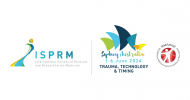Session outline
In keeping with the oft-quoted disability rights slogan, “nothing about us without us,” this short workshop has been conceptualized and will be in part presented by two people who both identify as disabled and chronically ill. For this conversation to be productive, stakeholders must be involved. This is also reflected in the language that has been used for this proposal and will be used for the formal presentation. Context will always be provided when discussing reclaimed language.
Disability is a form of diversity. The lived experience of having a disability impacts the way in which one moves through life and interacts with their surrounding environment. In this talk, we will discuss the following points: 1) conceptualizations of disability communities and cultures, 2) specific health care needs of disabled persons and 3) the ADEPT-CARE protocol, a nine-step tool for ensuring accessibility during a patient encounter; and 4) how to actively engage patients as experts of lived experience into research in academic medicine.
A well-received earlier workshop on the themes of disability culture was presented by this team at ISPRM 2023 that focused heavily on the nature of disability cultural competency. This new iteration at ISPRM 2024 will expand on the ideas presented in our original workshop to greater encompass ideas of specific health care needs, accessibility, and research in PM&R clinical care and academic medicine.
Disability comprises a major component of the identity of many PWD, yet it is often ignored, undervalued or diminished by clinicians when interacting with their disabled patients. We will explore elements of disability as cultural competency through examples from North American disability culture, since this is the culture that two of the presenters exist within. We will discuss concepts including disability etiquette, spoon theory, and inspiration porn. The role of humor and satire as a method of expression and resilience among PWD will also be discussed.
There are specific health concerns for people with life-long disabilities that may be overlooked compared to their non-disabled or temporarily disabled peers. During this talk, research on the nature of these health care needs will be presented to enable better recognition and appreciation of the needs of patients and peers with disabilities.
The ADEPT-CARE protocol (Smeltz et al., 2023) is a nine-step framework for thinking through how to make a medical visit accessible for persons with disabilities. The principles within surrounding ensuring accessibility and their relevance to clinical practice will be discussed.
The misunderstanding of disability and lived experience is also reflected in research teams that investigate themes and ideas pertinent to the disability community, but does not include them as partners in the conception and conduction of research. Lastly, we will inform attendees on up-to-date approaches to patient-engagement in research.
In an effort to enhance the learning of the attendees and the application of the principals in this workshop, the last section will be a brainstorming session. The speakers will form small groups with the audience members to allow for more nuanced conversation and creation of strategies of how these concepts may be applied in attendees’ practices and lives.
Learning outcomes
- Define and be able to recognize disability culture
- Appreciate the role that disability culture plays in how disabled persons interact with health care
- Appreciate the specific rehab-related health concerns faced by disabled communities
- Learn and be able to apply the ADEPT-CARE protocol to make PM&R care more accessible
- Brainstorm ways in which disability cultural competency, an understanding of the specific rehab-related health concerns in disability communities and the ADEPT-CARE protocol can be applied to attendees’ own practices
Target audience
- Allied health
- Medical practitioners
- Students
- Trainees
- Nursing staff
- General public
We believe that the information provided in this talk will be of interest to those involved in healthcare, health research, and the general public. With at least 15% of the world’s population having a disability, understanding disability culture and the specific needs of disabled people, both as a patient population and as a component of accessibility is important to everyone.



